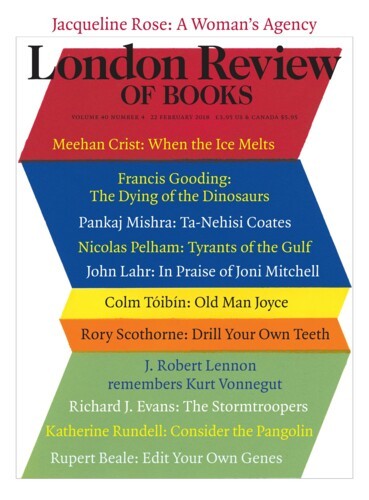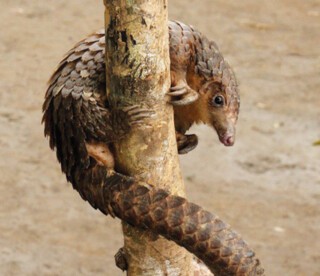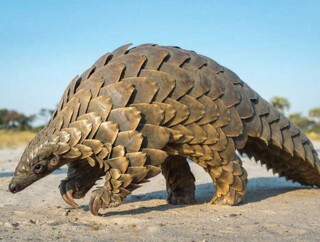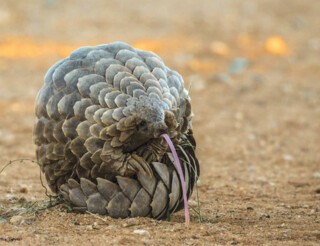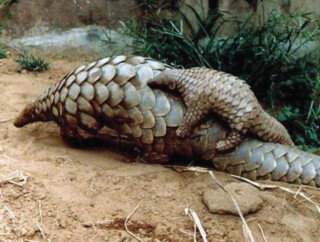To reach the pangolin is difficult, which feels only reasonable; something so remarkable shouldn’t be gained with ease. She lives in a wildlife conservation project outside Harare, near the airport. The roads in Harare have been deteriorating for years; gaps are patched with house bricks, and during the rains it would be possible to bathe a Great Dane in the potholes. Most of the road signs have been stolen – the rumour was that they were used for coffin handles during the cholera outbreak in 2008, although that’s probably largely apocryphal – and you drive by guesswork and hope. Until recently there were police roadblocks every twenty streets or so; the new regime has put a stop to them, one of the very few visible indications of the change of government. Hot pink and purple bougainvillea still grow at the verge, and threaten to encroach on the traffic lights.
The pangolin is known as a scaly anteater, because of its diet, and because it’s the only mammal entirely covered in scales, but the description does not acknowledge the fact that the scales are the same shade of grey-green as the sea in winter, and the face that of an unusually polite academic. The tongue of a pangolin is longer than its body, and it keeps it tidily furled in an interior pouch near its hip. The name comes from the Malay word penggulung, meaning ‘roller’; when threatened they curl into a near-impenetrable ball.
Their defence mechanism has made them easy prey to humans; they effectively render themselves portable. Pangolins are currently the most trafficked animals in the world, their scales used in traditional Chinese medicines and their flesh eaten as a delicacy; roasted pangolin meat is thought to stimulate lactation and improve blood circulation. In Zimbabwe, folklore initially forbade the hunting of pangolin; latterly, though, the expansion of the Chinese market into Africa as Asian pangolins became increasingly endangered meant that rural communities have been offered an alternative (illegal) source of income. A 2007 report in the Guardian quoted a chef in Guangdong on the means of preparation:
We keep them alive in cages until the customer makes an order. Then we hammer them unconscious, cut their throats and drain their blood. It is a slow death. We then boil them to remove the scales. We cut the meat into small pieces and use it to make a number of dishes, including braised meat and soup. Usually the customers take the blood home with them afterwards.
Beijing customs have seized more than a tonne of scales being shipped into China; each tonne the equivalent of 1660 animals. It is a fact so exhausting, so dreary and grotesque, that it’s difficult to fathom. We consume beautiful things.
This particular pangolin has a keeper, a man who walks with her through the bush from anthill to termite mound for ten hours a day, keeping her always in sight. She needs to consume roughly 70 million insects a year in order to stay alive. If the distance is relatively short, she walks. If it’s longer, she is carried in her keeper’s arms, or in a specially designed backpack. He lays her down on the ground to show how a pangolin walks; she moves on her hind legs only, her forelegs raised and her long claws clasped together in front of her, as if knitting her fingers together in anxious thought. She returns to her handler, setting one hind foot on his shoe in order to allow herself to be more easily lifted onto his shoulder. It is unlike anything I have seen. I come away with an entirely impractical, Antony-and-Cleopatra passion for her; but unauthorised ownership of a pangolin comes with a nine-year prison sentence in Zimbabwe. I am very glad.
Pangolins are more beautiful than seems plausible in this fallen old world; they look as though they should be strictly prelapsarian. And they are in fact prehistoric; they are 80 million years old, in contrast to our eight million. Of the eight species of pangolin, two are listed as Critically Endangered in the IUCN Red List of Threatened Species. There isn’t much time left to save them.
Send Letters To:
The Editor
London Review of Books,
28 Little Russell Street
London, WC1A 2HN
letters@lrb.co.uk
Please include name, address, and a telephone number.
